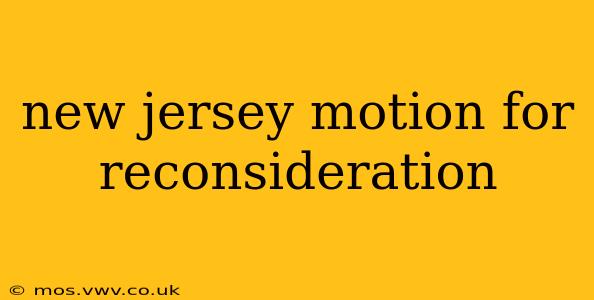A Motion for Reconsideration in New Jersey allows a party to ask the court to re-examine its prior decision. This isn't a second chance to re-argue your case, but rather an opportunity to address significant errors of fact or law that may have impacted the judge's ruling. Understanding the intricacies of this motion is crucial for anyone navigating the New Jersey court system. This guide will explore the process, requirements, and best practices for filing a successful Motion for Reconsideration in the Garden State.
What is a Motion for Reconsideration in New Jersey?
In New Jersey, a Motion for Reconsideration is a formal request filed with the court asking it to reconsider a prior order, judgment, or decision. It's a post-judgment motion, meaning it's filed after the court has already issued a ruling. The motion doesn't allow for the re-litigation of the entire case; instead, its purpose is to address specific issues that the moving party believes the court overlooked or misinterpreted. These issues typically involve demonstrable errors of law or fact that could materially alter the outcome.
When Can You File a Motion for Reconsideration in New Jersey?
The timing of filing a Motion for Reconsideration is critical. New Jersey Rule 4:49-2 governs these motions. Generally, you must file the motion within 20 days after the entry of the order or judgment being challenged. Missing this deadline can be fatal to your motion.
What Grounds Justify a Motion for Reconsideration in New Jersey?
To succeed, your motion must demonstrate that the court committed a palpable error – a clear and obvious mistake – of law or fact. This isn't simply disagreeing with the court's decision; you need to show a specific error that substantially affected the outcome. Examples include:
- Intervening Change in Law: A significant change in the law occurred after the court's decision that would likely alter the outcome.
- New Evidence: The discovery of new and material evidence that wasn't available during the original proceedings. This evidence must be compelling and couldn't have been obtained through reasonable diligence before the initial ruling.
- Clerical Error: The court made a demonstrable clerical mistake in its order or judgment.
- Manifest Denial of Justice: The court's decision resulted in a clear injustice that necessitates reconsideration.
How to File a Motion for Reconsideration in New Jersey
The process involves drafting a comprehensive motion that clearly articulates the grounds for reconsideration. This usually includes:
- Notice of Motion: Formal notification to the opposing party that you intend to file the motion.
- Supporting Brief: A detailed legal brief explaining the specific errors of fact or law, citing relevant case law and statutes. This section is crucial and must convincingly demonstrate the court's errors.
- Supporting Affidavit(s): Sworn statements providing evidence to support your claims. This might include affidavits from witnesses, experts, or even new documentary evidence.
- Proposed Order: A draft order reflecting the changes you seek the court to make.
What Happens After Filing a Motion for Reconsideration in New Jersey?
After filing, the opposing party will have an opportunity to respond. The court will then review the motion, the response, and any other relevant materials. The judge may grant the motion, deny it, or schedule oral arguments to clarify the issues. The court’s decision on the motion is final, unless appealed.
What if My Motion for Reconsideration is Denied in New Jersey?
A denial of a motion for reconsideration doesn't necessarily end your legal options. You may have grounds to appeal the original court decision to a higher court. However, the grounds for appeal are different and typically involve showing that the trial court's ruling was erroneous as a matter of law.
Can I File a Second Motion for Reconsideration in New Jersey?
Generally, only one Motion for Reconsideration is permitted. Filing a second motion without compelling justification is highly unlikely to be successful and could even lead to sanctions.
Does the judge have to grant the Motion for Reconsideration?
No. Judges have discretion in deciding whether to grant or deny a motion for reconsideration. The burden is on the moving party to demonstrate compelling reasons for reconsideration based on palpable error.
This information is for educational purposes only and should not be considered legal advice. Consult with a qualified New Jersey attorney for advice specific to your situation. They can guide you through the complexities of filing a Motion for Reconsideration and help ensure your rights are protected.
